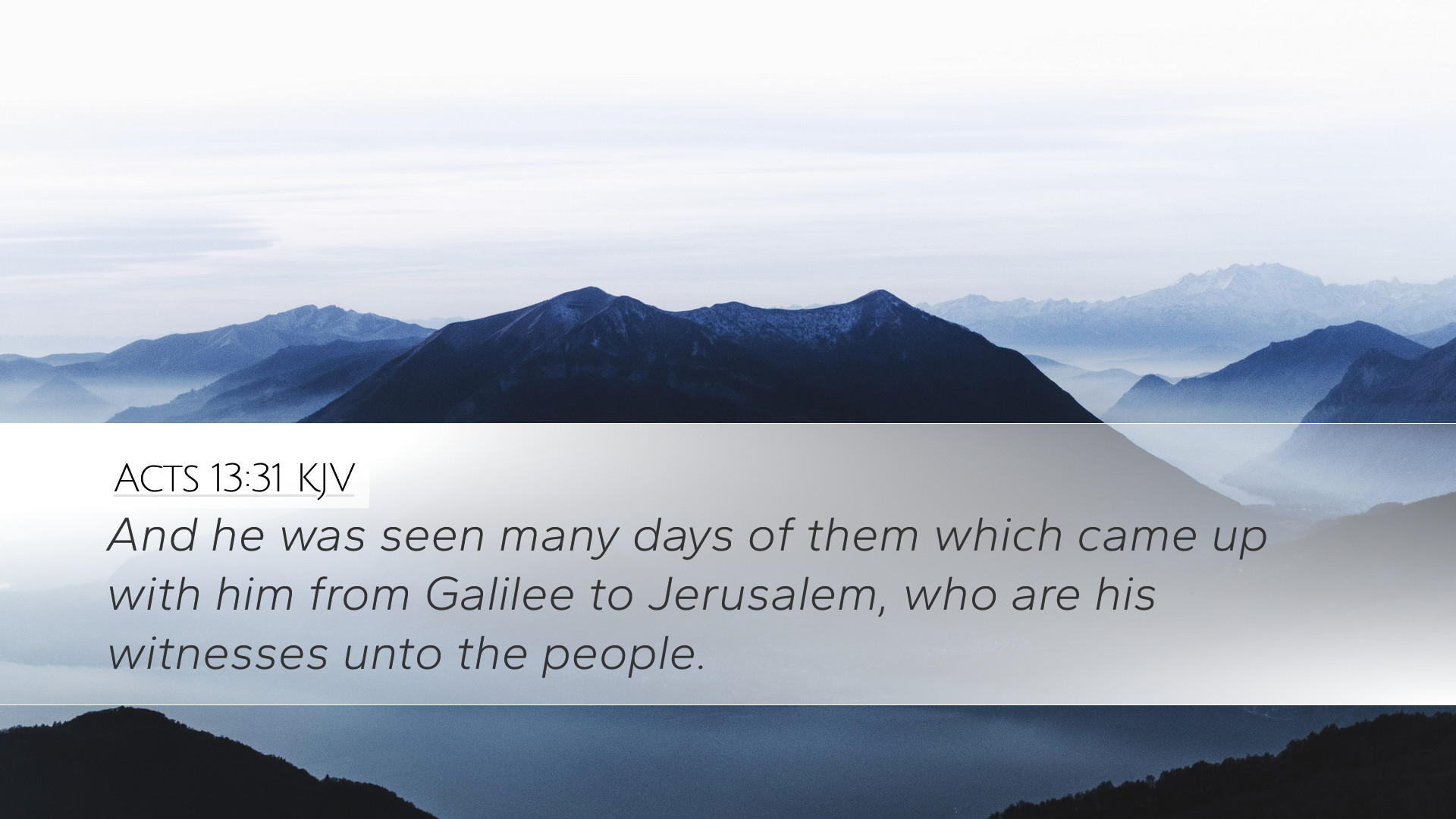Commentary on Acts 13:31
Acts 13:31 states, "And he was seen many days of them which came up with him from Galilee to Jerusalem, who are his witnesses unto the people." This verse is pivotal in understanding the early Christian proclamation of the resurrection of Jesus Christ and serves as a witness to His followers' experience in the aftermath of this miraculous event. It emphasizes the importance of eyewitness testimony in the spread of the Gospel.
Contextual Analysis
This passage is situated within Paul's first recorded sermon in Acts, where he addresses the synagogue in Pisidian Antioch. His emphasis on Jesus’ resurrection is a central theme in his message.
The historical backdrop is essential for understanding this verse. The early Christians were not just preaching a philosophy but a historical fact—the bodily resurrection of Jesus, which they saw as the fulfillment of God’s promises in the Hebrew Scriptures.
Insights from Public Domain Commentaries
Matthew Henry
Henry emphasizes the significance of Jesus being seen after His resurrection. He notes that the witnesses were not only those who had lived with Jesus but also those whose lives were transformed by their encounters with Him. This testimony played a crucial role in validating the truth of the resurrection and the legitimacy of the gospel they proclaimed.
Furthermore, Henry illustrates how the post-resurrection appearances were meant to strengthen the faith of the disciples. They were divinely prepared to spread the message of Christ by their personal experiences, which were integral to the formation of the early Church.
Albert Barnes
Barnes focuses on the term “witnesses,” stating that it refers to those who can give firsthand accounts of what they have seen and heard. The apostolic credentials were rooted in personal experience, and it is through these witnesses that the message of Christ was authenticated.
He also remarks on the theological implications of witnesses being called to proclaim the resurrection. It signifies that the work of the apostles is not merely an act of persuasion but is grounded in the actual events of Jesus’ life, death, and resurrection, which gives it authority.
Adam Clarke
Clarke provides a detailed examination of the term "many days," highlighting the intentionality behind this phrase. He suggests that Jesus’ appearances over an extended period were significant; they served to dispel any doubts and provided ample evidence for the truth of His resurrection.
Clarke further notes the importance of the location—Jerusalem—as it was the very place where Jesus was crucified. This underscores the idea that those who bore witness to His resurrection were testifying in the context of their previous experiences of His suffering and death.
Theological Implications
The verse encapsulates several theological tenets that are important for pastors and theologians alike. The resurrection is central to Christian doctrine; it affirms Jesus as the Son of God and the validity of His teachings. The concept of being a witness implies a call to action for modern believers—to testify to their faith in Jesus based on their personal experiences and the historicity of Christ.
Witnessing and Evangelism
The role of a witness in the life of a believer is crucial. Just as the early apostles were commissioned to spread the Good News, contemporary believers are also charged with sharing their faith. The challenge remains to communicate the resurrection's significance effectively amidst contemporary skepticism.
Continued Relevance
The resurrection was not a one-time event but a continual promise of hope for believers. The emphasis on the witnesses underscores the idea that the resurrection's power should continue to transform lives today. It serves as an invitation to believers to reflect on their own lives in light of the resurrection.
Conclusion
Acts 13:31 is a profound reminder of the foundational truth of Christianity—the resurrection of Jesus, validated by eyewitness accounts. It invites pastors, students, and scholars to delve deeply into the implications of this truth for both personal faith and communal witness. Understanding the weight of witnesses enhances the call for modern believers to embody and share the transformative power of the resurrection in their lives and ministries.


